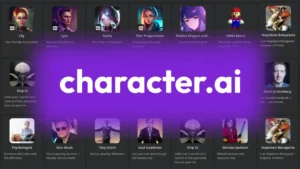Character AI: Welcome, tech enthusiasts, to a journey into the fascinating realm of Character AI! In this blog post, we’ll delve into what Character AI is, its diverse applications across industries, how it operates, potential challenges, and the promising future it holds.
What is Character AI?

Character AI, short for Artificial Intelligence for characters, refers to the use of artificial intelligence algorithms to create lifelike and interactive characters in various digital environments. These characters can range from non-player characters (NPCs) in video games to virtual assistants and storytelling avatars.
Applications Across Industries
Character AI finds its footprint across diverse sectors, revolutionizing user experiences and interactions:
- Gaming: In video games, Character AI brings NPCs to life, making them more responsive, adaptive, and realistic. For instance, NPCs can exhibit human-like behaviors, emotions, and decision-making skills, enhancing the overall gaming experience.
- Virtual Assistants: Chatbots and virtual assistants leverage Character AI to engage users in personalized conversations, provide assistance, and streamline customer service interactions. By understanding user intent and context, these assistants offer tailored responses, improving customer satisfaction.
- Storytelling Platforms: In virtual reality (VR) and augmented reality (AR) experiences, Character AI plays a pivotal role in crafting immersive narratives. Characters interact with users in real-time, adapting their dialogue and actions based on user input, creating captivating storytelling experiences.
How Does Character AI Work?
Character AI operates through a combination of machine learning algorithms, natural language processing (NLP), and decision-making systems. These algorithms analyze user inputs, context, and predefined parameters to generate appropriate responses and behaviors for characters.

Challenges and Considerations
While Character AI holds immense potential, it also poses certain challenges and ethical considerations:
- Data Privacy: Collecting and processing user data to personalize interactions raises concerns about data privacy and security.
- Algorithmic Bias: Biases in training data can lead to discriminatory behavior in Character AI systems, reinforcing stereotypes or excluding certain demographics.
- Ethical Use: Ensuring ethical use of Character AI involves transparency in AI decision-making, respecting user consent, and mitigating potential harms.
Future Prospects
Looking ahead, Character AI is poised to revolutionize various industries:
- Education: Personalized tutoring systems powered by Character AI can cater to individual learning styles, adapting content and feedback to students’ needs.
- Therapy: AI-driven virtual therapists can provide support and guidance to individuals facing mental health challenges, offering accessible and non-judgmental assistance.
- Entertainment: From interactive storytelling experiences to AI-generated content creation, Character AI opens up new avenues for creative expression and entertainment.

Frequently Asked Questions (FAQs)
- What makes Character AI different from traditional AI? Character AI focuses specifically on creating lifelike characters with personalities, emotions, and interactive capabilities, whereas traditional AI encompasses a broader range of applications.
- How do gaming companies use Character AI to enhance player experiences? Gaming companies implement Character AI to develop NPCs that exhibit human-like behaviors, adapt to player actions, and enhance the overall immersion and engagement in games.
- Can Character AI understand and respond to emotions? Yes, Character AI can analyze emotional cues in user inputs through sentiment analysis and respond with appropriate emotional expressions and dialogue.
- What are the potential risks associated with Character AI? Risks include privacy concerns related to data collection, algorithmic biases leading to discriminatory behavior, and the potential misuse of AI-generated content for malicious purposes.
- How can Character AI benefit customer service interactions? By employing Character AI in virtual assistants and chatbots, businesses can offer personalized and responsive customer support, improving satisfaction and efficiency in customer service interactions.
As we embark on this technological journey, let’s embrace the potential of Character AI while remaining vigilant about its ethical implications and societal impact. Together, we can shape a future where AI-powered characters enrich our lives in meaningful and positive ways.

